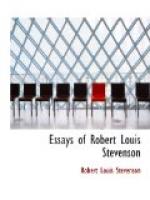We all of us appreciate the sensations; but as for caring about the Permanence of the Possibility, a man’s head is generally very bald, and his senses very dull, before he comes to that. Whether we regard life as a lane leading to a dead wall—a mere bag’s end,[17] as the French say—or whether we think of it as a vestibule or gymnasium, where we wait our turn and prepare our faculties for some more noble destiny; whether we thunder in a pulpit, or pule in little atheistic poetry-books, about its vanity and brevity; whether we look justly for years of health and vigour, or are about to mount into a Bath-chair, as a step towards the hearse; in each and all of these views and situations there is but one conclusion possible: that a man should stop his ears against paralysing terror, and run the race that is set before him with a single mind. No one surely could have recoiled with more heartache and terror from the thought of death than our respected lexicographer; and yet we know how little it affected his conduct, how wisely and boldly he walked, and in what a fresh and lively vein he spoke of life. Already an old man, he ventured on his Highland tour; and his heart, bound with triple brass, did not recoil before twenty-seven individual cups of tea.[18] As courage and intelligence are the two qualities best worth a good man’s cultivation, so it is the first part of intelligence to recognise our precarious estate in life, and the first part of courage to be not at all abashed before the fact. A frank and somewhat headlong carriage, not looking too anxiously before, not dallying in maudlin regret over the past, stamps the man who is well armoured for this world.
And not only well armoured for himself, but a good friend and a good citizen to boot. We do not go to cowards for tender dealing; there is nothing so cruel as panic; the man who has least fear for his own carcass, has most time to consider others. That eminent chemist who took his walks abroad in tin shoes, and subsisted wholly upon tepid milk, had all his work cut out for him in considerate dealings with his own digestion. So soon as prudence has begun to grow up in the brain, like a dismal fungus, it finds its first expression in a paralysis of generous acts. The victim begins to shrink spiritually; he develops a fancy for parlours with a regulated temperature, and takes his morality on the principle of tin shoes and tepid milk. The care of one important body or soul becomes so engrossing, that all the noises of the outer world begin to come thin and faint into the parlour with the regulated temperature; and the tin shoes go equably forward over blood and rain. To be overwise is to ossify; and the scruple-monger ends by standing stockstill. Now the man who has his heart on his sleeve, and a good whirling weathercock of a brain, who reckons his life as a thing to be dashingly used and cheerfully hazarded, makes a very different acquaintance of the world, keeps all his




